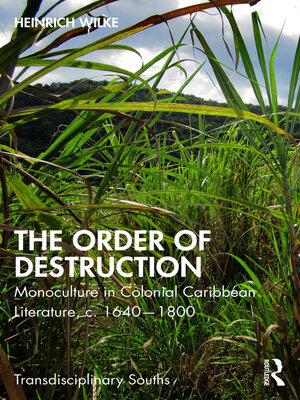The Order of Destruction
ebook ∣ Monoculture in Colonial Caribbean Literature, c. 1640-1800 · Transdisciplinary Souths
By Heinrich Wilke

Sign up to save your library
With an OverDrive account, you can save your favorite libraries for at-a-glance information about availability. Find out more about OverDrive accounts.
Find this title in Libby, the library reading app by OverDrive.



Search for a digital library with this title
Title found at these libraries:
| Library Name | Distance |
|---|---|
| Loading... |
This book studies sugarcane monoculture, the dominant form of cultivation in the colonial Caribbean, in the later 1600s and 1700s up to the Haitian Revolution. Researching travel literature, plantation manuals, Georgic poetry, letters, and political proclamations, this book interprets texts by Richard Ligon, Henry Drax, James Grainger, Janet Schaw, and Toussaint Louverture.
As the first extended investigation into its topic, this book reads colonial Caribbean monoculture as the conjunction of racial capitalism and agrarian capitalism in the tropics. Its eco-Marxist perspective highlights the dual exploitation of the soil and of enslaved agricultural producers under the plantation regime, thereby extending Marxist analysis to the early colonial Caribbean. By focusing on textual form (in literary and non-literary texts alike), this study discloses the bearing of monoculture on contemporary writers' thoughts. In the process, it emphasizes the significance of a literary tradition that, despite its ideological importance, is frequently neglected in (postcolonial) literary studies and the environmental humanities.
Located at a crossroads of disciplines and perspectives, this study will be of interest to literary/cultural critics and historians working in the early Americas and in Atlantic studies, to students and scholars of agriculture, colonialism, and (racial) capitalism, to Marxists and postcolonial critics, and to those working in the environmental humanities and in Global South studies.







